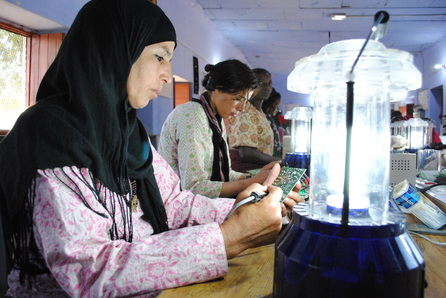|
TVO (TVOntario) is currently running a doc series called "Why Poverty?", asking why a billion people around the world still live in poverty, and what can be done about it.
Last night's film, "Solar Mamas", shows us how women from income-poor communities all over the world are selected and trained to become solar engineers in a six month residential program at Barefoot College in India. They return after six months, bringing solar-powered electricity and income earning potential to their remote villages. Educational access and opportunity are themes that have been gnawing at me since watching India's Daughter on Netflix (profiling the infuriating rape case of Jyoti Singh in Delhi in 2012). So when I watched Solar Mamas, I was drawn into the story of this woman from Jordan, who faces strong resistance from her husband in pursuing the course. Seeing how the women connect and collaborate and really want to learn new skills, was inspiring. The film also opens with a provoking question: "Are women better at getting out of poverty than men?" Development experts such as Amartya Sen (my favourite Development Economist!) have long-touted the importance of education for girls in raising standards of living, decreasing infant mortality, increasing levels of health, and in increasing education levels for the next generation. Grameen Bank founder Mohammed Yusuf has also explained how women tend to invest money into their children's health and education at higher rates than men: When women start making money, the first beneficiary of her income is her children.. but it doesn't happen so quickly when the father is the income earner. There are a lot of very positive things when you address the problem of poverty through women.
As you'll see in the film, challenges with changing mindsets remain. Still, programs such as this one at Barefoot College are bringing power to communities and helping to awaken power within these women!
For more on Barefoot College visit their site, or check out Founder Bunker Roy's TED Talk here.
Watch the TVO doc "Solar Mamas" here (or on their website):
0 Comments
 We’ve all hit that wall dealing with numbers. For me, the moment came in first year calculus. The proofs were over my head, my profs may as well have been talking textbooks, and I felt like an idiot. I seriously thought about dropping out of my program once a term. Thankfully I had a support system to help me get through (really good and smart friends, and a mother who told me I would move back to the suburbs if I dropped out. Ironically, chalk one up to fear-based motivation!) That all or nothing feeling - you either “get it” or you don’t - is one that is pervasive in math learning and teaching. As I teach a group of adult learners in a foundations math course this term, I’m starting to see the signs of anxiety in them as learners. A quiz recently on conversion rates had a handful of them visibly stressed, and verbally cursing about having to do this and wanting to quit. This was a group of people, who, until this point, had been surprisingly excited about learning math. So what is going on here, and what can we do?! I love Tina Fey. There is something about her clever style of humour, her quirkiness, and honesty that make me want to be the woman’s friend. Not to mention her amazing impersonation of Sarah Palin or the gem of a show she created in 30 Rock (some Jack Donaghy highlights here). But one of my favourite contributions that Fey has given the world boils down to two simple pages from her book “Bossypants”, in what she calls “Tina Fey’s Rules of Improvisation that will Change your Life”. She starts with the idea of open-mindedness: The first rule of improvisation is AGREE. Always agree and SAY YES. When you’re improvising, this means you are required to agree with whatever your partner has created. So if we’re improvising and I say, “Freeze, I have a gun,” and you say, “That’s not a gun. It’s your finger. You’re pointing your finger at me,” our improvised scene has ground to a halt. But if I say, “Freeze, I have a gun!” and you say, “The gun I gave you for Christmas! You bastard!” then we have started a scene because we have AGREED that my finger is in fact a Christmas gun.  On a recent trip to India, I find myself on a visit to the beautiful city of Mysore, Karnataka. On the early morning train from Bangalore, I am seated across an upbeat young woman, a licensed Naturopath pursuing her MBA and teaching part time. We quickly find lots to chat about. Slowly, an elderly man walks onto our train car, with his charming grandson and daughter. The elderly man is seated beside me, while his grandson sits in the next section over (spoiler alert: the grandson does not turn out to be the man of my dreams!). Stooping over, the old man gives us each a quick nod, before getting comfy with his newspaper. He lasts a few minutes in silence, before he peers over and says: “You two haven’t stopped speaking since I got here!!”. Cracking a smile, he adds, “You know, 50 years ago, ladies would not be talking the way you are.” This is the beginning of my three hour conversation with the train ride professor. |
Categories
All
AuthorA passionate educator.. on a quest for a schooling model to love! Archives
August 2017
|



 RSS Feed
RSS Feed
